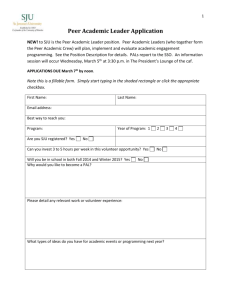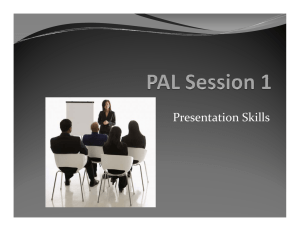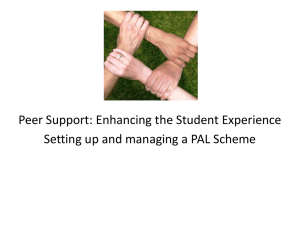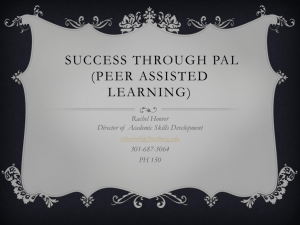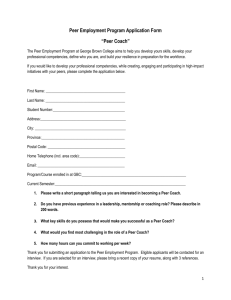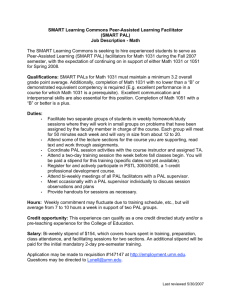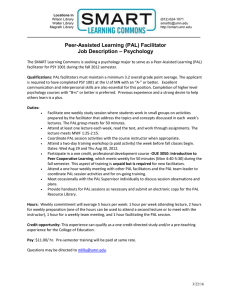workshop quotes - Bournemouth University Microsites
advertisement
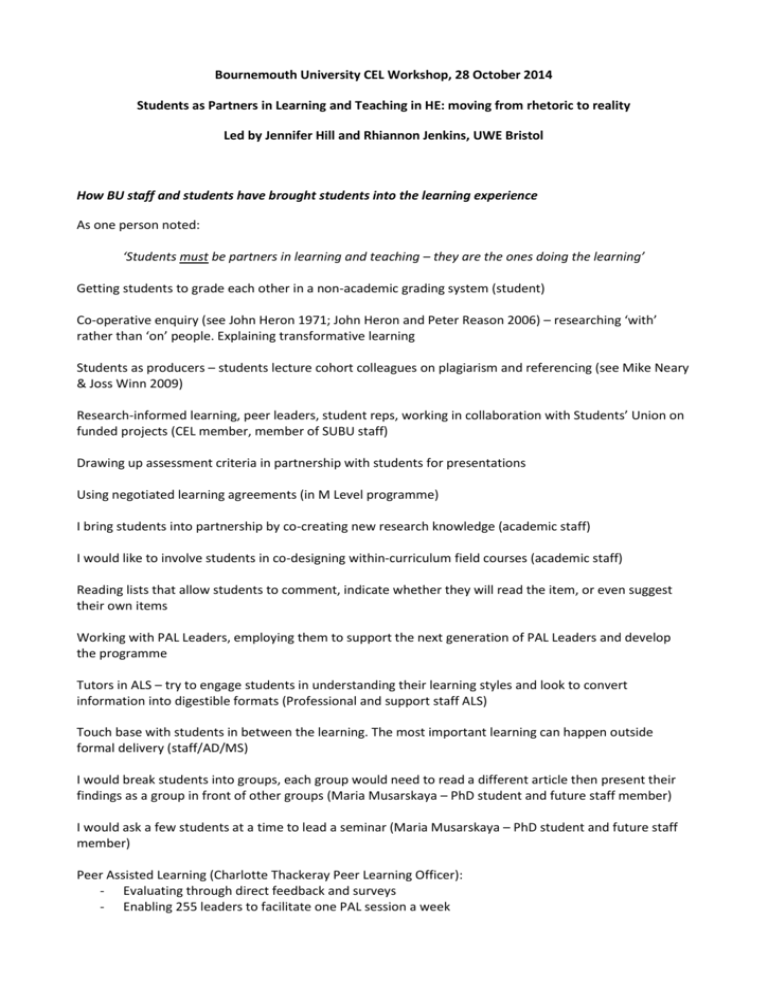
Bournemouth University CEL Workshop, 28 October 2014 Students as Partners in Learning and Teaching in HE: moving from rhetoric to reality Led by Jennifer Hill and Rhiannon Jenkins, UWE Bristol How BU staff and students have brought students into the learning experience As one person noted: ‘Students must be partners in learning and teaching – they are the ones doing the learning’ Getting students to grade each other in a non-academic grading system (student) Co-operative enquiry (see John Heron 1971; John Heron and Peter Reason 2006) – researching ‘with’ rather than ‘on’ people. Explaining transformative learning Students as producers – students lecture cohort colleagues on plagiarism and referencing (see Mike Neary & Joss Winn 2009) Research-informed learning, peer leaders, student reps, working in collaboration with Students’ Union on funded projects (CEL member, member of SUBU staff) Drawing up assessment criteria in partnership with students for presentations Using negotiated learning agreements (in M Level programme) I bring students into partnership by co-creating new research knowledge (academic staff) I would like to involve students in co-designing within-curriculum field courses (academic staff) Reading lists that allow students to comment, indicate whether they will read the item, or even suggest their own items Working with PAL Leaders, employing them to support the next generation of PAL Leaders and develop the programme Tutors in ALS – try to engage students in understanding their learning styles and look to convert information into digestible formats (Professional and support staff ALS) Touch base with students in between the learning. The most important learning can happen outside formal delivery (staff/AD/MS) I would break students into groups, each group would need to read a different article then present their findings as a group in front of other groups (Maria Musarskaya – PhD student and future staff member) I would ask a few students at a time to lead a seminar (Maria Musarskaya – PhD student and future staff member) Peer Assisted Learning (Charlotte Thackeray Peer Learning Officer): - Evaluating through direct feedback and surveys - Enabling 255 leaders to facilitate one PAL session a week - Recruiting peer support leaders (former leaders) to observe current leaders Student assistants in the library (peer-to-peer support with basic library skills) (Librarian, academic support) Engagement with industry – commercial transition, academic facilitation on a live project Staff to facilitate student input through sign-posting opportunities for feedback input e.g. training in peer assessment - purpose and value not academic grade I have allowed students to change the title of their assignments, whilst still being able to meet learning outcomes with assignment content/remit (Jonny Branney, Lecturer Adult Nursing) I would like to allow students to write presentations and run sessions with me as a ‘guide’ (Jonny Branney, Lecturer Adult Nursing) I have implemented undergraduate consultancy projects (staff) I have invited online students post-induction to develop introductory activities to be used by new cohorts (staff) I would like to involve students in building a video bank of ‘how to’ materials (staff) One of the problems on our course is that we receive the critical information the week before hand-in. I fed this back and now we receive the information at least 2-3 weeks in advance (Student) What worries BU staff and students about engaging students in learning partnership? There are too many evaluation forms for students to complete throughout the year – with no real enhancement of the student experience If part of a learning enhancement project – too many procedures, forms involved – not enough university support Self-selection by those who possibly stand to benefit most but who arguably have the greatest need (or vice versa – we miss those who really need to engage) Variation in student experience. Student dominators Time – coverage of materials. Access for ALL students Students might not participate or turn up, that material might not be interesting (Maria Musarskaya (PhD student, future staff member) Delegation, trust, ceding control of sessions, dissemination of misleading information Tokenistic approach to partnership e.g. ‘we asked students ...’ (SU staff member) Not clear enough communications to students about why they are changing the approach i.e. explain deeper learning (SU staff member) To what extent the research ethics approval process could get in the way of education research related to student engagement Too many different personalities and skills sets within a class. All have different learning methods, therefore only some rise to the occasion (student) PAL Leaders and student reps are often students who have a number of negative issues or students who want an extra tick on their CV. Maybe neither have learning outcomes as their motivation (student) Every student and non student, especially at a young age, has a skill. Unfortunately they are not all academic s this would only work if it was from a younger age (student) Within a working project group, certain individuals will naturally take charge, whilst others will naturally take a back seat (student)
